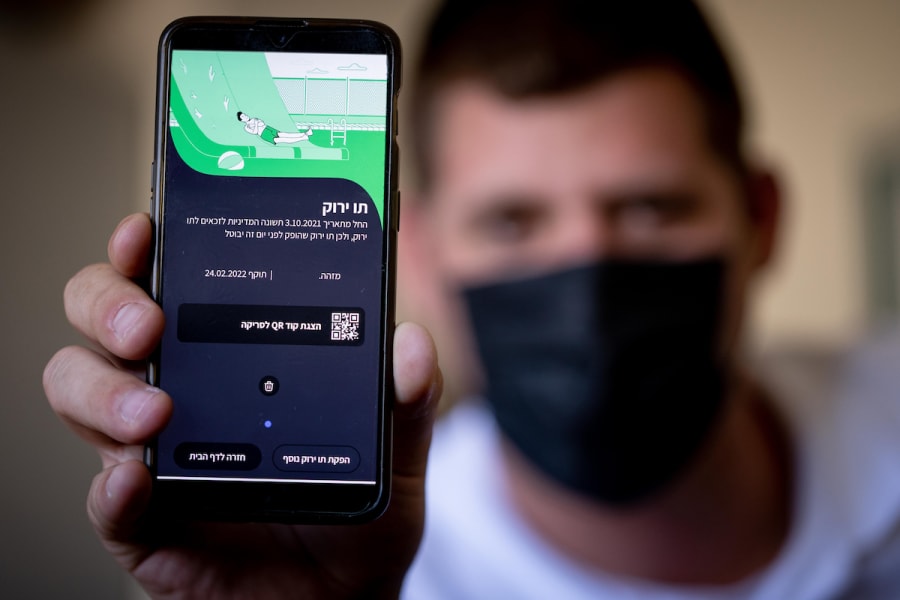Government extends Green Passport at least another week despite objections from hospital directors
Even health officials admit the Green Passport lost its effectiveness in last wave as vaccinated also accounted for bulk of the infections

Despite opposition from hospital directors, members of Israel’s Corona Cabinet voted to extend the Green Passport by another week, which buys them time to consider whether to keep it longer, change the restrictions or cancel it entirely.
The Green Passport was implemented in March and is used to show proof of vaccination or recovery from COVID. It is required to enter certain events and venues including restaurants, gyms and hotels.
Many medical experts and politicians across the country have been calling to cancel it, saying it is no longer epidemiologically relevant. In Israel it was largely used as an incentive to get vaccinated.
The Ministry of Health has been debating whether the Green Passport has lost its effectiveness during this latest wave, since many people who are vaccinated or recovered have also become infected.
In fact, several restrictions were loosened or canceled and the borders opened to tourists during the record-setting Omicron wave, which began in late November. Israel set a record of highest daily cases per capita last week. The number of infections appears to have peaked within the past few days, but Israel is still registering a near 30% positive rate and yesterday clocked in more than 74,000 infections. The daily record was 85,000, set last Sunday.
Israel is also approaching a high number of people hospitalized in serious condition. One year ago, the number was 1,200, which was considered the red line for hospitals. Today some 1,099 are in serious condition and the number is expected to rise.
Nevertheless, the representatives of three hospitals lobbied the Coronavirus Cabinet to scrap the Green Passport and to continue avoiding lockdown.
“We never collapsed in the two years [of pandemic]. The collapse was more psychological than physical. Did we collapse in terms of patient overload? No. I do not recall that happening to us,” said Prof. Yaakov Jerris, director of the COVID ward at Tel Aviv Sourasky Medical Center. “Defining a serious patient is problematic. For example, a patient with a chronic lung disease always had a low level of oxygen, and now he is with coronavirus, which technically makes him a serious coronavirus patient, but that's not true. The patient is in a difficult condition because he has a serious underlying condition.”
Dr. Roi Ilan, director of the Intensive Care Unit at Rambam Health Care Campus in Haifa, said the number of “serious patients” includes anyone who showed up to the hospital for other reasons yet tests positive for COVID when he gets there.
“The wrong calculation actually puts a lot of pressure on the system. A patient who is hospitalized in the coronavirus ward receives double the amount of nurses,” he explained. “Half of the staff inside are protected, caring for the patient, and the other half are waiting outside – ready to be replaced. It is a huge burden.”
A new outline was introduced to schools this week requiring twice weekly testing for students. Parents are being asked to conduct at-home tests on Sunday and Wednesday and fill in a form on the Health Ministry website. Children who test positive cannot go to school.
The purpose of the new plan is to exempt children from having to quarantine if they come into contact with a verified COVID carrier.
“Getting children back to school routine is the order of the day,” Education Minister Yifat Shasha-Biton said. “The place for healthy children is at school.”
The Education Ministry said that only around 35% of parents reported their children’s test results Sunday morning, with some 3% of those coming back positive.
Prime Minister Naftali Bennett said “parents need to show responsibility, take care to test the children properly, and send them to school only if they feel well.”
“A few more weeks like this, if we all act responsibly, we will get through this wave together as well,” he said.
The new rules are “putting 2.5 million students on the testing radar twice a week,” Bennett added.
Health Ministry Director-General Nachman Ash said during an interview on Reshet Bet radio that the ministry is considering dropping the requirement for boarding a plane to Israel with a negative COVID test.
“People argue, if you need a negative test to get on a plane why not require one for riding a bus,” he said. “It's one of the things we are looking at whether we should continue with them.”
Israel would continue requiring tests upon landing at Ben-Gurion Airport.
Three ministers voted against the Green Passport's extension – Justice Minister Gideon Sa’ar, Education Minister Yifat Shasha-Biton and Finance Minister Avigdor Liberman.

Nicole Jansezian was the news editor and senior correspondent for ALL ISRAEL NEWS.














